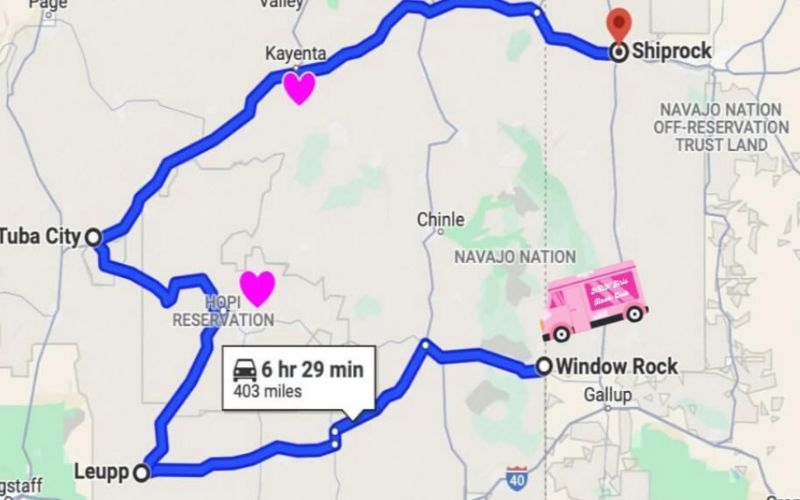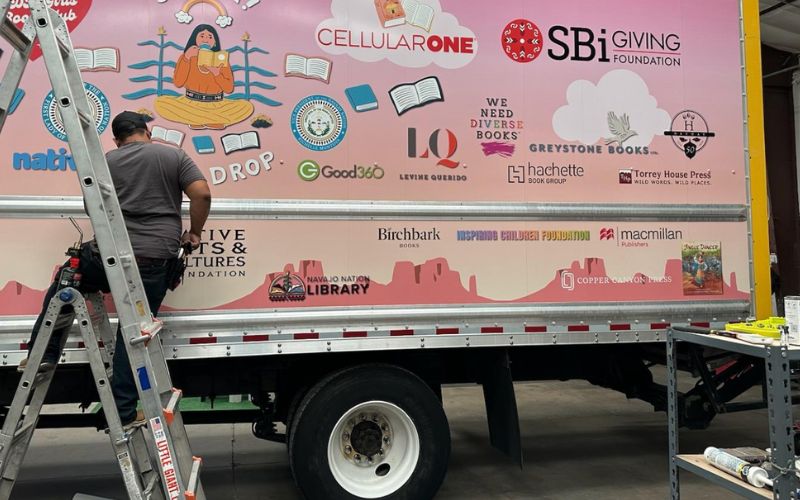
- Details
- By Kaili Berg
Organized by the NDN Girls Book Club, a nonprofit that aims to inspire a love of literature in Native youth, the journey kicked off in Window Rock, Ariz. on April 1, and will end in Shiprock, Ariz., on April 5. The Rezmobile will cover a total of 403 miles, with stops in communities like Leupp and Tuba City along the way. The NDN Girls Book Club, Abalone Mountain Press, 4KINSHIP, Cellular One, and the SBi Giving Foundation teamed up for this effort.
"I am tremendously thrilled to be part of this endeavor and to witness the joy on children's faces as they receive these books. Being present when the first kids arrive and seeing their excitement will be an unforgettable experience," Kinsale Drake (Diné), founder of NDN Girls Book Club, told Native News Online.
The aim is not only to promote reading but also to celebrate Indigenous authors, inspire young Native writers, and lift the spirits of the community with free gifts at each stop.
Along with giving out books, the NDN Girls Book Club is sharing product donations from 4KINSHIP, a Navajo brand supporting social good projects on the reservation.
“We've brought together the perfect team to support young people and promote Indigenous-authored books,” Amy Denet Deal, Founder of 4KINSHIP, told Native News Online. “The thoughtfulness of the NDN Book Club in organizing every detail, from the food to the swag, makes kids feel special and valued. It's all about showing them that we care and that they're VIPs at this beautifully organized event.”
Established in April 2023, the NDN Girls Book Club dedicates its resources to hosting author discussions, consucting writing workshops, participating in events at book fairs across the country, and stocking Indigenous-owned bookstores and tribal libraries with diverse titles by Indigenous authors.
“For us, our mission is always uplifting youth, but also illuminating and making things really exciting for them that are still living in all of us,” Drake said. “I want people to feel safe in these spaces, surrounded by other Native people who share the love for books.”
 The Rezmobile prepares for its journey. (photo/Instagram)
The Rezmobile prepares for its journey. (photo/Instagram)
Despite strides made, the publishing industry still has significant ground to cover in amplifying Native American voices. Approximately 0.49 percent of all registered authors in the U.S. are Native American, according to Words Rated.
"We want kids to know these stories exists,” Drake said. “They can be artists and writers, which are crucial for our communities.”
The literacy rates on the Navajo Nation are lower than the national average, with many adults lacking a high school diploma or GED, according to the Navajo Nation. But initiatives like this, led by passionate individuals like Drake and her NDN Book Club co-founders Pte San Win Little, offer hope for a brighter future.
NDN Book Club has ambitious goals for the future, aiming to expand its reach and impact within Indigenous communities and beyond. One of its primary objectives is to establish a mobile library through the acquisition of a dedicated vehicle, envisioned as a pink van. This mobile library would enable the organization to bring books directly to various reservations, bringing the culture of reading and literacy among Indigenous youth and families.
To achieve this goal, NDN Book Club is seeking support from both Native and non-Native communities. Individuals can contribute to the realization of this vision by making donations, no matter how small, on their website.
“We just need to get each community to be great allies. They need their pink van to drive around every reservation and be doing the amazing work that they are doing. Every bit of Tribal land on Turtle Island deserves something like this,” Deal said.
More Stories Like This
Watermark Art Center to Host “Minwaajimowinan — Good Stories” ExhibitionMuseums Alaska Awards More Than $200,000 to 12 Cultural Organizations Statewide
Zuni Youth Enrichment Project Takes Top Emerging Artist Apprentices to Phoenix for Artistic Exploration and Cultural Immersion
From Dishwasher to Award-Winning Chef: Laguna Pueblo's Josh Aragon Serves Up Albuquerque's Best Green Chile Stew
Rob Reiner's Final Work as Producer Appears to Address MMIP Crisis
Help us defend tribal sovereignty.
At Native News Online, our mission is rooted in telling the stories that strengthen sovereignty and uplift Indigenous voices — not just at year’s end, but every single day.
Because of your generosity last year, we were able to keep our reporters on the ground in tribal communities, at national gatherings and in the halls of Congress — covering the issues that matter most to Indian Country: sovereignty, culture, education, health and economic opportunity.
That support sustained us through a tough year in 2025. Now, as we look to the year ahead, we need your help right now to ensure warrior journalism remains strong — reporting that defends tribal sovereignty, amplifies Native truth, and holds power accountable.
 The stakes couldn't be higher. Your support keeps Native voices heard, Native stories told and Native sovereignty defended.
The stakes couldn't be higher. Your support keeps Native voices heard, Native stories told and Native sovereignty defended.
Stand with Warrior Journalism today.
Levi Rickert (Potawatomi), Editor & Publisher


